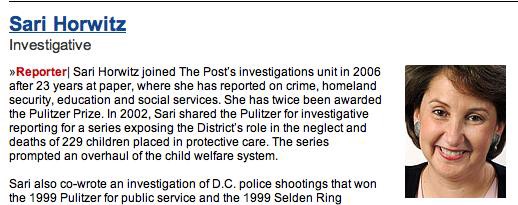Resume Bias and Plagiarism

Yesterday, when the Washington Post published a terrible and vague Editor’s Note about plagiarism, I looked up the articles that they seemed to be referencing as plagiarized. (Here and here.) And then I discounted them, because of resume bias, and went looking for similar stories in the paper from someone more junior or more obviously inexperienced. After all, the reporter, Sari Horwitz, has been with the paper nearly 30 years. She is a two-time Pulitzer winner. She has a Master’s from Oxford!
And the stories were about Tucson and she’s from Tucson. So it didn’t make any sense.
And but then, the Post named her today and published her apology, and said they’d looked at all her stories from “this year” (this calendar year?) and spot-checked some older work, and found no other evidence of plagiarism. (I would go a little deeper? But, sure, I know, who has time.)
So she’s been suspended for three months, and not fired — because they have both familiarity bias and probably resume bias too. (Also: it would be stupid to fire her anyway.)
But in her apology, she touches on neither how or why it happened, and that’s something I’d love to know. How do you end up with 15 paragraphs of someone’s story in your own? That’s literally impossible to execute as an “oh my sources document got mixed up in my story” maneuver. (I think so, at least? I mean, maybe someday it’ll happen to me! Everyone is afraid of doing something stupid.) So but how? It’s either a cry for help, a statement of anger at the institution or the act of a person so preoccupied with other things that she no longer is even thinking about her job. In plagiarism cases we so rarely understand why it happened, and this is frustrating, because we almost have a window into finding out.
